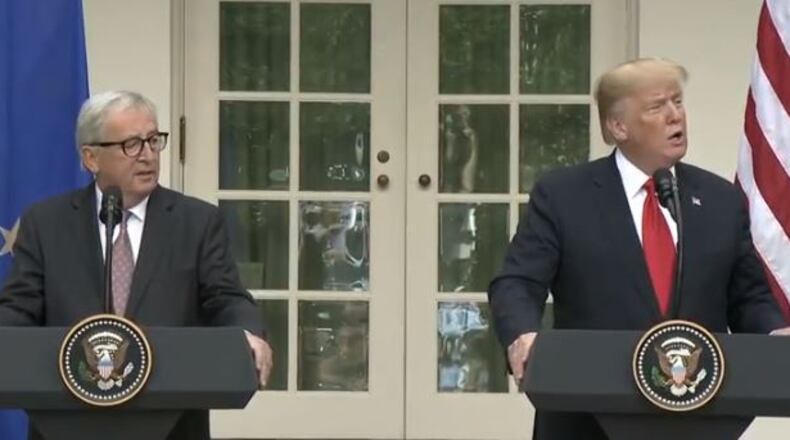Stepping back from what seemed like the onset of a trade war between the U.S. and European Union, President Donald Trump and the European Commission chief said Wednesday at the White House that they would start wide-ranging talks on trade, agreeing to hold off on further tariffs and trade duties, and work towards the goal of a lowering trade barriers between the two giant trading partners.
"This is why we agreed today, first of all, to work together towards zero tariffs, zero non-tariff barriers, and zero subsidies on non-auto industrial goods," the President said to applause in the White House Rose Garden.
"So we had a big day," Mr. Trump said.
Standing with the President, European Commission chief Jean-Claude Juncker said it was time to iron out differences on trade, not to undermine the $1 trillion trade relationship between Europe and the U.S.
"If we team up, we can make our planet a better, more secure, and more prosperous place," Juncker said.
"Our trading partners are looking at the trade imbalances in a different light under President Trump," said Sen. David Perdue (R-GA). "The long-term goal has never been tariffs, but equal access to other markets.”
"This is a positive development," said Sen. Rob Portman (R-OH) of the U.S.-E.U. agreement to trade talks. "I look forward to seeing the fruits of these negotiations."
The agreement to halt further trade retaliation by each side, and engage in new negotiations, came as President Trump has come under increasing criticism - especially from fellow Republicans in the Congress - as they charge his aggressive trade actions against Europe, China, Mexico and Canada have only hurt U.S. businesses, and especially farmers.
"The administration tells us don't worry, be patient," said Sen. Bob Corker (R-TN), "but from where we sit, it appears that in a Ready, Aim, Fire fashion, the White House is waking up every morning and making it up as they go."
"Now is the time for EU and US – both victims to unfair China trade practices – to unite against China," said Sen. Lindsey Graham (R-SC), as lawmakers in both parties have complained that he President has wasted valuable time by going after Europe, Canada and Mexico on trade, instead of focusing on Beijing.
As for what Messrs. Trump and Juncker agreed to on trade - here are the basic bullet points, as the two countries agreed to:
+ Work toward zero tariffs on industrial goods
+ Work toward zero trade barriers and zero subsidies on 'non-auto industrial goods'
+ Work to reduce barriers on trade in services, chemicals, pharmaceutical products
+ Have Europe import more US liquefied natural gas
+ Have Europe import more US soybeans
+ Consider measures for WTO reform
+ Address unfair trading practices by other nations
+ Hold off on further tariffs while negotiating
+ US will reassess tariffs on EU steel and aluminum
+ Europe will reconsider retaliatory tariffs as talks progress
+ Launch dialogue on standards dealing with trade bureaucracy
In the White House Rose Garden, Mr. Trump labeled it a 'new phase' in the US-EU relationship, moving away from threats to slap up to a 25 percent tariff on imported cars from Europe.
The agreement to hold talks quickly defused what had become a growing political problem for the President, as Republicans issued a parade of statements in recent days breaking with Mr. Trump's tough talk on trade, especially the move to funnel $12 billion in trade aid to farmers hurt by retaliatory tariffs against the U.S.
"The administration clobbers farmers with an unnecessary trade war then attempts to assuage them with taxpayer handouts," said Sen. Pat Toomey (R-PA), as several Republicans labeled the aid plan, 'welfare for farmers.'
About the Author
The Latest
Featured



